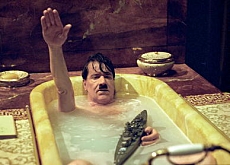
Swiss directs controversial Führer farce

Basel-born director Dani Levy says he is preparing for a "tidal wave of criticism" of his latest film, the first German comedy about Adolf Hitler.
Only a third of Germans think “Mein Führer: die wirklich wahrste Wahrheit über Adolf Hitler” (Mein Führer: The Truly Truest Truth about Adolf Hitler”) is a good idea, according to a recent survey.
The film, which treads ground that until recently would have been off-limits, features a demoralised, drug-addled, impotent and incontinent Hitler who plays with a toy battleship in the bath, dresses his dog in Nazi uniform and takes acting tips from a Jewish concentration camp inmate.
“I’m aware we’re in a glasshouse that’s been built on a mass grave,” said 49-year-old Levy, who now lives in Berlin, where Mein Führer was filmed.
Unfortunately, early reviews suggest that Levy, himself Jewish, was worried that too much laughter would shatter the glasshouse windows.
Mein Führer follows the Oscar-nominated Der Untergang (The Downfall), which in 2004 broke ground by portraying Hitler from a German perspective, with Swiss actor Bruno Ganz giving a controversially intimate and human portrait of Hitler’s final days.
Levy mocked Der Untergang and other recent portrayals of the Nazi era, saying they aimed to put Hitler on a pedestal. Instead, he says his film is “something small, fast, cheeky and politically incorrect”.
“I don’t want to give this cynical, psychological wreck of a person the honour of a realistic portrayal,” he said. “I had the feeling that I must do it with another genre, do it by being able to exaggerate through comedy.”
Farce
Levy’s film starts in December 1944, with Berlin in ruins and Hitler too depressed to deliver a much-awaited speech to rally his people. His propaganda minister, Joseph Goebbels, finds a solution in Adolf Grünbaum, a fictional Jewish actor who coached Hitler at the beginning of his career and is now in a concentration camp.
Grünbaum uses the mission to try to kill Hitler, but fails. So he puts him through humiliating exercises such as crawling around and barking like a dog.
All this would have been unthinkable a decade ago, said Paul Nolte, a professor of contemporary history at Berlin’s Free University.
In addition, the gradual dwindling of the Nazi-era generation – more than 80 per cent of Germans today were born after 1941 – has given the country a more detached view of its past.
Rewrite
Nevertheless, according to a survey only 35 per cent of Germans thought the film was a good idea – in the former East Germany the figure fell to 22 per cent.
Levy explained that he had long felt the need to explain for himself how it was possible for Germans to follow Hitler, describing making the film as a sort of “primal scream”.
But several commentators have warned against trivialising the Nazi era.
“There is something freeing about being able to see the funny side of Hitler. After all he is a laughable man,” said Ralf Fücks of the Heinrich Böll Foundation. “But that is not to forget that he is a laughable man who triggered a World War and the murder of six million Jews.”
Test audiences did not forget and were outraged by Levy’s original idea of having Hitler, still alive, looking back on his life and giving an amusing and avuncular voiceover.
Levy bottled it and rewrote the script to have the desperate and terrified Grünbaum act as the film’s narrative centre, weighing the tragi-comedy scales too much towards tragedy, according to some critics.
Even Hitler himself, German musician and comedian Helge Schneider, said he was disappointed with the final cut, which he described as “pretty flat”.
The film has succeeded in generating another bout of German introspection and Levy is optimistic it will find a market abroad, but how shockingly funny non-Germans find images of Hitler in a bath with a toy boat remains to be seen.
swissinfo, Thomas Stephens
Notable Hitler films:
The Great Dictator (1940), directed by Charlie Chaplin
To Be or Not To Be (1942), Ernst Lubitsch
The Producers (1968), Mel Brooks
Der Untergang (Downfall) (2004), Oliver Hirschbiegel
Dani Levy was born in Basel on November 17, 1957.
He is a film maker, theatrical director and actor. His films include RobbyKallePaul, I Was on Mars, Meschugge, and I’m the Father.
His most successful film is Alles auf Zucker! (Go for Zucker!), a 2004 comedy about a secular Jew from the former East Germany who has to reconcile himself with his Orthodox brother to gain their mother’s inheritance.
Levy is one of the founders of the German company X Filme Creative Pool.
Mein Führer opened in Germany on January 11 and will open in Switzerland on January 18.

In compliance with the JTI standards
More: SWI swissinfo.ch certified by the Journalism Trust Initiative





























You can find an overview of ongoing debates with our journalists here . Please join us!
If you want to start a conversation about a topic raised in this article or want to report factual errors, email us at english@swissinfo.ch.